
by Sarvapujya Golokapati Das | Jan 10, 2024 | Festivals
Around 500 years ago Lord Shree Krishna appeared in the form of Chaitanya Mahaprabhu in this world. Shree Chaitanya Mahaprabhu was born in 1486 in Mayapur, Bengal province, in phagun Purnima. His father was Shree Jagannath Mishra and mother was Shreemati Sachi Devi. He was the youngest son of his parents who later became famous by the name of “Nimai Pandit” and after accepting Sannyasa Ashram He was known as Lord Krishna Chaitanya Mahaprabhu. After presenting His divine pastimes for 48 years He left for His divine Abode from Jagannath Puri.
Who is Chaitanya Mahaprabhu
Shree Chaitanya Mahaprabhu was a very important and special incarnation of God. God has taken this form for the people in the age of quarrel and sorrow i.e. “Kali-Yuga” for their welfare. Most of the people even don’t know Him and also don’t even recognize Him. If anyone knows Him, they know Him as a saint or a devotee. Those who know Him they praise Him as a devotee which is not wrong because He has taken this incarnation just to teach us how to do “Bhakti” or become a pure devotee. However, it is not fully correct; He is undoubtedly a devotee of God but also God Himself.
Lord Shree Krishna advents just to show the people of Kali-Yuga how to do bhakti, but this is also a fact that people do not believe that Chaitanya Mahaprabhu is God himself. They say, “We know that He was a great Saint, a great Devotee, has done a great work in devotional life but how can we believe that he was Personality of Godhead Krishna Himself?”
How to check authenticity of God
So, to answer this query, the first question arises, “How can we identify any incarnation of God?” especially in today’s era where we get to know about many self-declared Gods here and there. People are confused and don’t understand who is God actually?
So, the truth is that, no one can become God; God is not a position which can be acquired. God is always God and will remain to be God always either in past, present or future. God cannot become anything except God and the one who is not God cannot become God in any condition.
Now the main question arises, “How can we identify the incarnation of God, what is the proof?” In reply to this query we should seek answers from an authenticated source. There should be information about the incarnation in the scriptures. Information like His place of appearance, time of appearance, His looks, purpose of appearance, His father and mother name. All these information should be present in the scriptures in order to identify the incarnation of God. These entire details one can find in depth in scriptures for Chaitanya Mahaprabhu. However, He is identified as secret incarnation of God.
Proof from Srimad Bhagavatam
God has hidden His real identity because He wanted to play the role of a devotee. The information can be found in Srimad Bhagavatam that God would come and spent His time doing the mass kirtan with His followers. This would do the welfare of human society.
According to scriptures every age has his own religion and by following that we can attain love of Godhead. “Naam Sankirtan” is the only religion of this age and so it was preached by Sri Chaitanya Mahaprabhu. This authenticate that Shri Chaitanya Mahaprabhu is none other than the Supreme Personality of Godhead.
Proof from Mahabharata
Second proof we can get from Mahabharata. When Bheeshma Dev was giving knowledge to Yudhisthira Maharaj there he pronounced Vishnu Sahasranama. He also described about Sri Chaitanya Mahaprabhu and told that Mahaprabhu body complexion would be like molten Gold, He would be very beautiful. He would accept Sannayas Ashram and would spread peace everywhere while doing the devotional service of God.
Proof from Chaitanya Upnishad
There is one more proof that can be referred. We have 108 Upanishads out of which one is Chaitanya Upanishad, and can be found in Atharva Veda. From this upnishad we can know that Brahmaji has one great ascetic son Pipalad. He questioned to Brahmaji, “What is the easiest route of welfare for the people of most fallen age, Kaliyuga? Which mantra should they chant? Which Demigod should they worship?”
Brahmaji became very happy and replied, “Govind who resides in Goloka Vrindavan Dham, is the beautiful deity form of Spiritual World. He is beyond material senses and is the Controller and Originator of Infinite Universes. He is the Absolute Truth whose lotus feet are meditated upon even by great saints and demigods. That Lord Sri Krishna will appear in Kali-Yuga as Gaura on the bank of Ganga in Navdeep Nagar. He will be known as Sri Chaitanya Mahaprabhu” Saying that, Brahmaji paid his obeisance unto the Lotus Feet of Chaitanya Mahaprabhu. Brahmaji very clearly told that Chaitanya Mahaprabhu is God himself and He even foretold that Chaitanya Mahaprabhu would spread happiness everywhere by chanting His own name:
Hare Krishna! Hare Krishna!
Krishna Krishna Hare Hare
Hare Ram! Hare Ram!
Ram Ram Hare Hare
Brahmaji also added, “This is an absolute mantra and it can be known only through Devotional service.”
“He is the Supreme Personality of Godhead who resides in everyone’s heart as Supersoul, parmatama. Whose feet are even worshipped by Anata Sheeshji and Lakshmiji. In Kali-Yuga, if someone wants to attain Lord Sri Krishna, it would be possible only by the path demonstrated by Sri Chaitanya Mahaprabhu”.
In this way, many scriptures clearly define that Sri Chaitanya Mahaprabhu is Lord Krishna Himself and He has taken this form to give love of Krishna to the people of Kali-Yuga using Hare Krishna Mahamantra.
Divine forms of Chaitanya Mahaprabhu
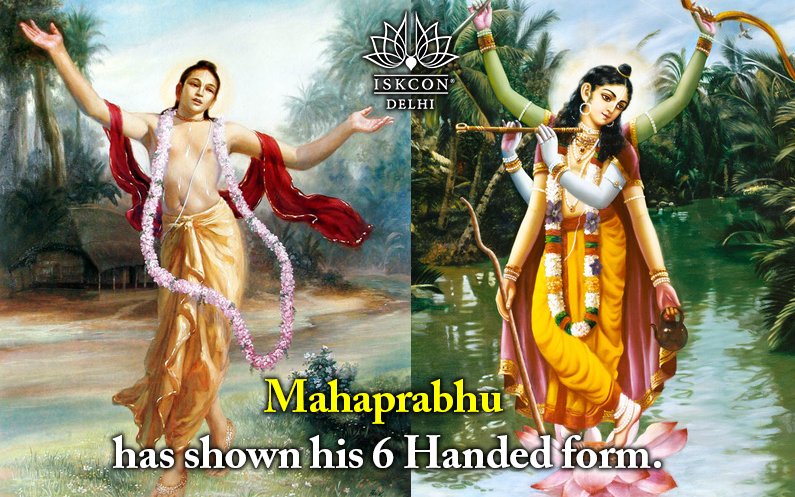
Apart from this if someone is God he should show his Universal form like Lord Sri Krishna has shown to Arjuna. Lord Sri Chaitanya Mahaprabhu had shown His universal form to Advaita Achraya. He presented his Varah form to Marari Gupt. Nityananda Prabhu who is Balrama Himself, Mahaprabhu presented Shatbhuj form in which he was playing flute from two hands as Krishna in Vrindavan, in the other two hands He was holding bow and arrow as Sri Ramchandra and in the other two hands He was holding Sannayas stick and kamandal as Chaitanya Mahaprabhu. He also presented His RadhaKrishna form to Ramananda Rai.
Transcendental pastimes of Mahaprabhu
Now let’s talk about the third prospective to identify and authenticate the incarnation of God. One’s capability to do something divine and extraordinary; which cannot be done by any Human Being. Sri Chaitanya Mahaprabhu performed so many divine activities which we can’t even imagine. Let us discuss one of such pastime.
When Sri Chaitanya Mahaprabhu after accepting Sannyaas Ashram was performing Naam Sankirtana along with a servant, Balabhadra Bhattacharya, He reached in today’s Jharkhand. At that time it was a big and dense forest there. As Chaitanya Mahaprabhu passed, doing Hari Naam Sankirtana, even wild animals gave them route to pass and danced on Krishna’s name. Tiger and Deer started treating each other with love and affection. This was the effect of God and devotion. Even Trees are attracted towards Him. In that way Deer, Peacock, Monkey and Cow rendered service to Lord Krishna. Learning for all of us, when deer and tiger can live together then why not we humans belonging to different caste, country can live together?
Peace formula for the world
Today, war happens between nations belonging to different castes. Even they fight within themselves. But from the above example we can see that if Krishna’s name and devotion will be spread everywhere, there would be love, brotherhood, compassion and friendship. Thus, vanishing all the bad qualities, lack of knowledge and violence at once.
Thus, we can see and understand that Sri Chaitanya Mahaprabhu is Lord Sri Krishna Himself, and there is practically no difference between the Teachings of Lord Krishna in Bhagavad Gita and teachings of Sri Chaitanya Mahaprabhu. As per the teachings of Sri Chaitanya Mahaprabhu and the Hari naam Sankirtana movement will develop peace and love in the entire world. That’s why we should celebrate Gaur Purnima as the Appearance Day of God Himself.
Your Smallest act of Charity can make a difference and bring smiles to Needy Faces.
by Sarvapujya Golokapati Das | Jan 9, 2024 | Ekadashi
Srila Bhakti Vinod Thakur Ji, a great Vaishnav Acharya, wrote in one of his devotional songs – “Madhav Tithi Bhakti Janani”. That means Ekadashi is the most important and lovable tithi to the Supreme Personality of Godhead, Lord Krishna. It pleases the Lord and bestows devotion unto the lotus feet of the Lord. That’s why one should always observe fast and abstain from taking grains on Ekadashi.
When does Shattila Ekadashi occur?
Ekadashi that occurs on Krishna paksha in the month of Magh is popularly known as Shat-Tila Ekadashi. Great Sage Pulastya once informed sage Dalabhya of the importance and story related to Shat-Tila Ekadashi, the slayer of all sinful reactions.
Sage Dalabhya asked, “O Great Sage, Pulastya, every living entity in this material world is involved in sinful fruitive works, and they would have to suffer in hells after death. How can they be saved from the hellish condition of life? Kindly please inform me. “
Sage Pulastya replied, “You are a saintly person and inquired about a very important question. Now, please listen carefully – In the month of Magh, people should try to control the unbridled senses and conquer over anarthas, namely: lust, anger, greed, illusion, pride (madness), and envy. One should also observe fast on the Ekadashi, which occurs on Ardhamula Nakshatra in Krishna Paksha of Magh month. One should purify by taking an early morning bath on Ekadashi and praying to the Lord, Shri Hari. One should chant Hare Krishna maha-mantra as much as possible.”
Story behind Sat-Tila Ekadashi
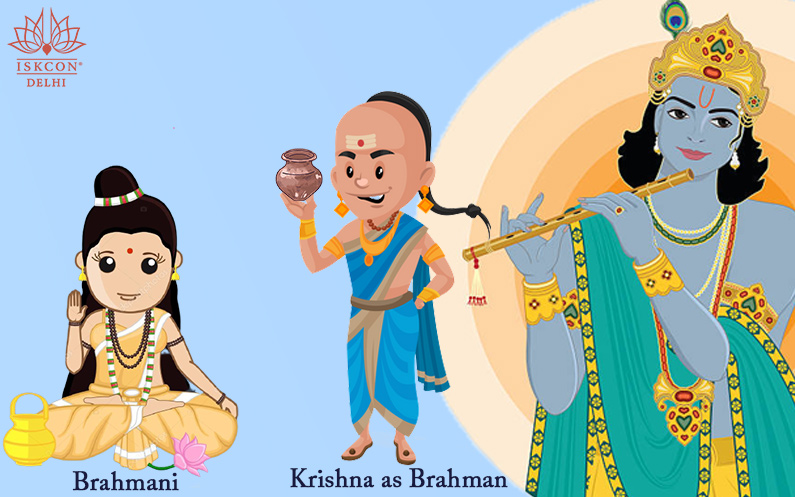
Once, Sage Narada also asked Lord Shri Krishna the same question. Lord Krishna replied, “O Narada, I would tell you a truthful story. Please do listen carefully. In ancient times, there was a Brahmani on the earth planet. She used to observe fast quite consistently. Once, she kept fast for the entire month, due to which her body became frail. Although she was knowledgeable, she never donated foodstuff or money to any Brahman or demigod. She had purified her existence already by observing rigorous fasting, but as she didn’t contribute any foodstuff ever, she wasn’t qualified for liberation. “
Lord Krishna said further, “I disguised myself as a Brahman and went on earth to ask for charity from the Brahmani. Seeing an extraordinary Brahman, she inquired and asked the Lord, ‘Please tell me truthfully, who you are?’ I didn’t answer and behaved nonchalantly. At which she angrily poured soil in my begging bowl. After that, I went back to my abode.
Due to her austerity, she also came to my abode after some time. She got a lovely palace to live in, but her castle didn’t have any foodstuff. Hurriedly, she came running to me and said she had always worshipped me by observing various fasts. She wanted to know why her palace didn’t have any foodstuff. I told her to go back to her castle first. Some demigoddess would come to meet you.
She should not open her palace’s gate till they tell her the importance and rituals of Shattila Ekadashi. So she ran back towards her castle. When the demigoddess came to meet her and asked her to open the palace’s gate, she refused and asked the demigoddess to tell her the importance of Sat-Tila Ekadashi fast. One of the demi goddesses agreed and said the Brahmani about Sat-Tila Ekadashi fast.
When Brahmani heard the significance and glorification of Sat-Tila Ekadashi, she opened her palace’s gate. Demigoddess saw that she was neither a Gandharva nor an Asura, but a human. Brahmani observed fast on Sat-tila Ekadashi as per the instruction received by the demigoddess. She became beautiful, and her palace became full of foodstuff.”
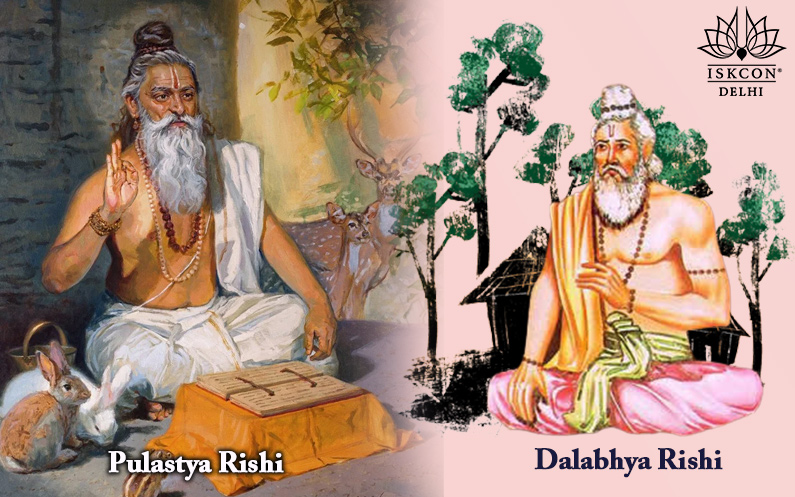
That was the importance and glorification of Shattila Ekadashi, which Lord Shri Krishna informed Narada, and Sage Pulastya told Sage Dalabhya.
Why should one observe Ekadashi fast?
We all should also observe fast on Sat-Tila Ekadashi. Following fast on this, Ekadashi removes misfortunes, poverty, and troubles from life, thus awarding liberation from earthly life. In reality, Ekadashi is a boon for all materially engrossed living entities. It removes sinful reactions of all previous births and transcends from the material world to the spiritual world.
How to observe fast in present times?
In various Purans, it is mentioned that one should not eat anything after sunset from the tenth day onwards. One should think of God while taking a rest at night. On the day of Ekadashi, one should rise early in the morning and worship Lord Shri Krishna after taking a bath. One should offer Tulsi leaves, sandals, Ganga water, and fruits to Lord. One should refrain from ill talks, lies, fraud and devote his time to chanting Krishna’s name, remembering Krishna’s various pastimes, and thinking of the Lord’s eternal abode.
For Kaliyuga, the present age of Kali, chanting of Hare Krishna Mahamantra is prescribed. Therefore, one should chant maha-mantra as much as possible. This will remove the dirt from the heart and consciousness accumulated over millions of birth in the material world and engage in the loving devotional service of the Supreme Personality of Godhead, Shri Krishna.
Hare Krishna Hare Krishna Krishna Krishna Hare Hare
Hare Ram Hare Ram Ram Ram Hare Hare
Fast opening time on 07th Feb 2024 – 7:06 AM to 10:45 AM (New Delhi)
Your Smallest act of Charity can make a difference and bring smiles to Needy Faces.

by Sarvapujya Golokapati Das | Jan 9, 2024 | Ekadashi
Our Vedic literature, Acharyas, tell us to observe fast on Ekadashi and other festivals. As per them, observing fast on Ekadashi and other important festivals is a must and an integral part of spiritual life. Acharyas tell us that such regulations are made for those who want to associate with the Lord, Shri Hari, in the transcendental world. All great souls follow the regulations and get the result.
Pastime behind Vijaya Ekadashi
Once Maharaja Yudhishthira asked Lord Krishna,“O Vasedeva! Which Ekadashi comes during the Krishna paksha of phalgun month? Please tell me about it.”
Lord replied that once upon a time Devarshi Narada asked Brahmaji, “Please tell me about the regulations that one should observe on the Krishna paksha Ekadashi of phalgun month”.
Brahmaji informed Narada, “O Narada! Ekadashi during the Krishna paksha of phalgun month is known as Vijaya Ekadashi. Observing fasting on Vijaya Ekadashi destroys sinful reactions for both old and new sins. I haven’t told anyone about this Ekadashi before. This Ekadashi provides victory to all human beings.”
Why Lord Ramchandra ji had to observe fast on Vijaya Ekadashi?
In Treta Yuga, when Lord Ramachandra ji accepted to live in the forest in exile for 14 years, He started living in Panchvati with Lakshman ji and Sitaji. Demon king Ravana kidnapped Sitaji there. When Lord Ram and Lakshman came to know about the incident They were saddened by sorrow. They started searching for Sitaji. In the course of searching for Sitaji, They met dying Jatayu. Jatayu told Them the whole abduction story of Sitaji and died, attaining a higher planetary system. Further searching for Sitaji, They befriended Sugreeva and Lord Ram ji killed Baali.
Hanuman ji went to Lanka and found Sitaji there. After burning Lanka, Hanuman ji returned back to Lord Ram and informed Him about the whole scenario. Lord Ram, after hearing from Hanuman, decided to start for Lanka with Sugreeva along with his army. Reaching the seashore, Lord Ram told Lakshman ji that there were many deadly living creatures in that unfathomable sea. How could they cross the sea easily?
Lakshman ji replied, “O Lord! You are the original Supreme Personality of Godhead. You are omniscient and there is nothing which is unknown to You. Sage Bakad Albhya has lived on this island since ancient times and his hermitage is nearby. O Raghunandan, we should enquire from him.”
Instructions from sage Bakad Albhya
So Lord Ram went to meet sage Bakad Albhya in his hermitage and greeted him. The great sage, seeing Lord Ram, understood immediately that Ram ji none other than the Supreme Personality of Godhead. Very humbly and with all respects he enquired from Lord Ram. He asked, “O Lord! How can I serve you? What is the motive behind your visit to my hermitage?”
Lord Ram replied, “O great sage! I am here to kill Ravana. Please tell me the way to cross this ocean.”
Bakad Albhya replied, “O Ram! By observing fast on Krishna paksha Ekadashi of phalgun month, undoubtedly You will win and You will be able to cross this ocean as well. To observe fast on this Ekadashi, one should make a pot of gold or silver or copper or mud and fill it with pure water. Decorate the pot with mango leaves and establish it on the deities altar. On the day of Ekadashi, after taking bath, one should worship the Lord, Shri Hari, with incense sticks, lamp, coconut, offerings. Thereafter spend the entire day chanting holy names of the Lord in front of the pot. Continue to chant holy names of the Lord the entire night. On dvadashi, on the bank of a river or a pond donate the pot in charity to an eligible brahman after worshipping the pot.”
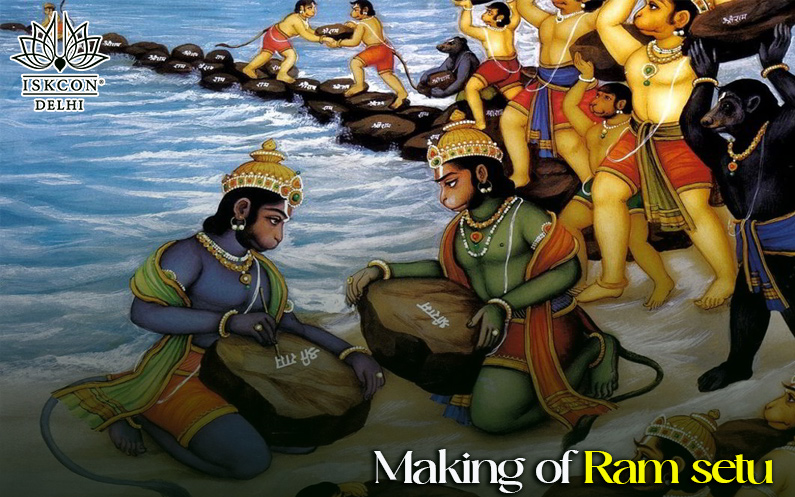
Sage continued and said, “O Ram! If you observe this fast along with all of Your commanders of the army, undoubtedly victory would be Yours.”
In this way, Brahma ji explained Narada, “Narada! As per instructions from the sage, Lord Ramchandra ji observed fast on the Ekadashi and became victorious. O Son!, By the effect of observing fast on this Ekadashi, people will get success and will attain higher planets.”
Lord Shri Krishna further assured that by abiding by the rules and regulations of Vijaya Ekadashi, one attains the result of performing Vajpayi sacrifice.
How to observe Ekadashi in Kaliyuga?
When the lord incarnated as Shri Ram, He personally also observed fast on Ekadashi, one can understand from this incident that Ekadashi is very very dear to the Lord. We all should also learn from the ideal character of Lord Shi Ramchandra ji and must observe fast on this Ekadashi with full determination. We all should chant more and more the holy names of the Lord so that the unwanted dirt of lust, anger, greed, illusion, madness, envy would be removed. Thus we can take shelter of the lotus feet of the Lord.
Hare Krishna!
Fast Breaking time:- 08th March from 06:38 AM to 10:34 AM (New Delhi)
Your Smallest act of Charity can make a difference and bring smiles to Needy Faces.
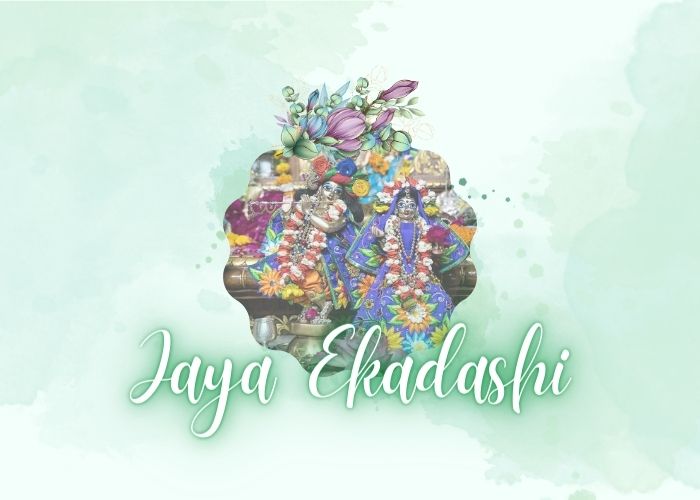
by Sarvapujya Golokapati Das | Jan 8, 2024 | Ekadashi
Vedic literature describes that observing fast on Ekadashi destroys all sins. Lord Shri Krishna pleases very much with this fast and bestows eternal blessings to the devotees. In each month, fast observation and worship of Lord Shri Krishna on every Ekadashi of Shukla Paksha and Krishna Paksha are prescribed as per Vedic injunction. There are incalculable benefits of Ekadashi. Ekadashi fast frees one from all sins and transcends this vast ocean of material existence. In various Purans, it is mentioned that one should not eat anything after sunset from the tenth day onwards. One should think of God while taking a rest at night. On the day of Ekadashi, one should rise early in the morning and worship Lord Shri Krishna after taking a bath. One should offer Tulsi leaves, sandals, Ganga water, and fruits to Lord. One should refrain from ill talks, lies, fraud and devote his time to chanting Krishna’s name, remembering Krishna’s various pastimes, and thinking of the Lord’s eternal abode.
➢ Vedic Evidence
We learn about this Ekadashi from a conversation between Lord Shri Krishna and Emperor Yudhishthira in Bhavisya Uttar Puran. Emperor Yudhishthira asked Lord, “Hey Janardan, what is the story behind Ekadashi on Shukla paksha in the month of Magh? How to observe fast on this Ekadashi and to whom should one worship?”
Lord Shri Krishna replied, “O great king, listen carefully. Ekadashi on Shukla paksha in the month of Magh is popularly known as Jaya Ekadashi. This auspicious date destroys all sins and can liberate one. Anyone who abides with it, will not have to suffer in ghostly species of life. That’s why one should consciously abide by and observe fast on Ekadashi.”
“Once Indra, King of heaven, along with other demigods and damsels, were strolling in the Nandan forest, which was decorated very beautifully with parijaat flowers. Indra, King of 50 crores of Gandharvas, organized a dance program in the forest to entertain themselves. Pushpadant, chief of Gandharvas and Chitrasen, chief musician of Indra’s assembly, with his wife Malani, was also there in the forest. Pushpadant’s daughter was Pushpavanti, and Malyavaan was the son of Chitrasen and Malani. They also participated in the dance to please King Indra. Pushpavanti and Malyavaan developed an affection for one another and became agitated. They were illusioned and couldn’t concentrate on their performances. They were unable to focus on the tone and tempo of the song due to which Indra understood and took it as his disrespect. He cursed them.”
➢ Indra’s curse to Malyavaan and Pushpavanti
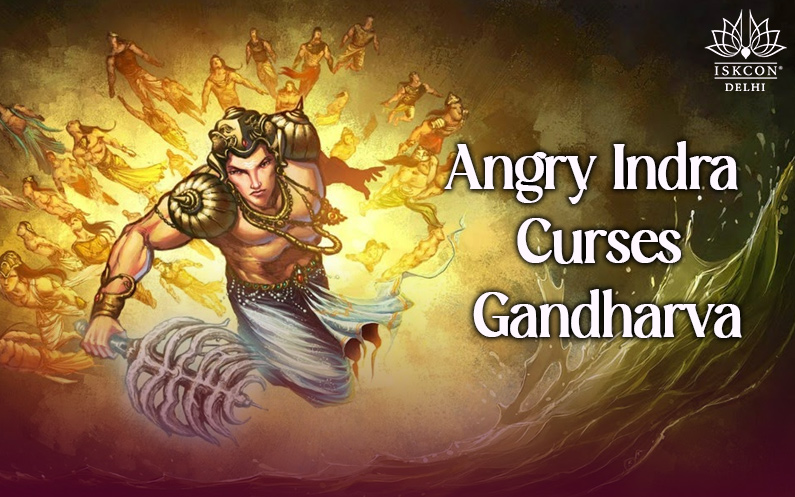
“King Indra angrily cursed them with the following words – ‘You fools, you both have disregarded and disobeyed my command thus disown you both. You should fall down to ghostly species and suffer for your misdemeanour in the lower planetary system as a couple’. They became extremely sad after hearing such harsh words from Indra. They fell down on earth as ghost couples and lived miserably near the Himalayan mountain. They lost their sense of smell, sense of taste, sense of touch, etc. They were unable to sleep even for a moment and thus were experiencing excruciating pain. That place was extremely cold and due to which they always had goosebumps and chattering teeth.”
“One day, he told his ghost wife, ‘We must have committed many sins in our previous life due to which we have got this miserable and horrible birth in ghostly species of life. It must be better to rot in hell than to suffer in this ghostly form. Therefore we should not commit any more sins in this life and try to get out of this form.’ In that way, they were living their lives.”
➢ The transformation from ghost form to demigods form
“On one day, they didn’t take any foodstuff and refrain from committing any sin, coincidently it was Jaya Ekadashi in the Shukla Paksha of Magh month. They didn’t even take any fruit or nongrain foodstuff. Tormented by tremendous sorrow, they spent their day sitting beneath a peepal tree until sunset. It was very cold that night, so they couldn’t even sleep for a moment.”
Lord Krishna addressed emperor Yudhishthira, “O King! Because they observed fast on Jaya Ekadashi and because they didn’t sleep that night; on the next day they were freed from the ghostly species of life. They got their original form of demigod and demigoddess back. Decorated beautifully with costly garments and ornaments, they departed for the heavenly planet. At that time, it started to rain with flowers. They went to meet Indra and paid their obeisances. Indra was amazed to see their original form and enquired from them, how did they get freedom from ghostly life?
Malyavaan replied, “O Indra! We were freed from ghostly life due to the causeless mercy of Lord Shri Hari and because of observing fast on Jaya Ekadashi.”
➢ Indra’s view on Jaya Ekadashi
Indra replied, “O Malyavaan! By observing fast on Jaya Ekadashi and by the causeless mercy of Lord Shri Krishna, not only you were freed from the ghostly condition of life but also became more venerable than us. Whoever takes shelter of Lord Shri Hari and observes fast on Ekadashi; they are worshippable. All glories to both of you.”
Lord Krishna further told Yudhishthira, “O King! Jaya Ekadashi even frees from the guilt of Brahma-hatya. It should be understood that one who has observed fast on Jaya Ekadashi, has already accumulated results of all charity and sacrifices. Just by hearing and reading the glories of Jaya Ekadashi, one gets the result of agnishtom sacrifice; by observing fast one gets to Vaikuntha.” In this way, Lord concluded the significance and glories of Jaya Ekadashi in Bhavishya Uttar Puran.
➢ Lord Varahadeva appearance day
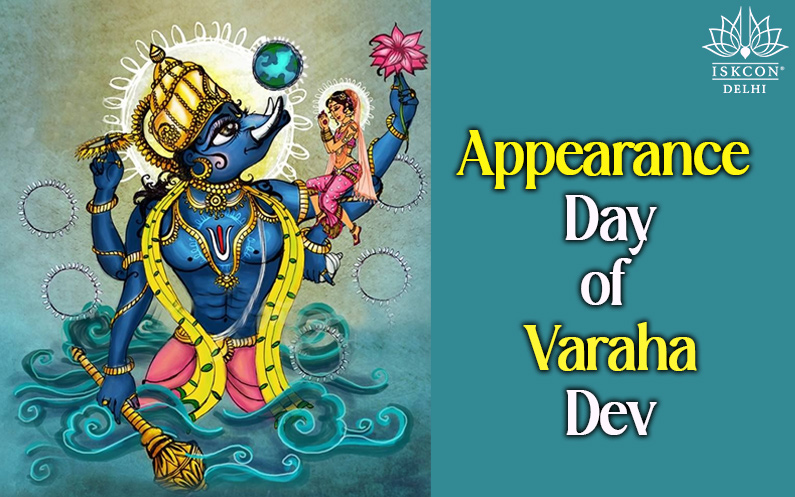
Lord Varahadeva appeared on the next day of Jaya Ekadashi i.e. Dwadashi. Thus on Jaya Ekadashi nirjala fasting is observed for half-day and celebration of Lord Varahadeva’s appearance on Dwadashi.
➢ Glories of Jaya Ekadashi
From the above story, we can understand that Malyavaan and Pushpavanti observed fasting on Jaya Ekadashi unknowingly. Even after that, they were not only freed from the ghostly conditions of life and got their original form back, but also became worshippable by Indra. What would be unattainable for one who observes fast very diligently on Jaya Ekadashi? One should think about it.
➢ How to observe Jaya Ekadashi in Kaliyuga?
Therefore, we all should observe fasting on this Ekadashi which is extremely lovable to Lord Shri Krishna and provides impetus to reach the supreme goal of one’s life, love of Godhead. We all should chant Hare Krishna mahamantra individually and in the group as much as possible, read scriptures like Srimad Bhagavad Gita, Srimad Bhagavatam, and concentrate on the lotus feet of the Lord by reducing the bodily needs on this day.
Hare Krishna Hare Krishna Krishna Krishna Hare Hare,
Hare Ram Hare Ram Ram Ram Hare Hare
Jaya Ekadashi Date:- 20 Feb 2024 (Tuesday)
Fast breaking time:- 21 Feb 2024 (Wednessday), between 06:55 am to 10:41 am
Your Smallest act of Charity can make a difference and bring smiles to Needy Faces.
by Sarvapujya Golokapati Das | Jan 5, 2024 | General
Introduction:
Born in 1513, Srila Jiva Goswami was a prominent figure in the Gaudiya Vaishnavism tradition. As the nephew of Srila Rupa Goswami and Srila Sanatana Goswami, he received initiation fromSrila Rupa Goswami and later became the acharya, the spiritual master, succeeding both Srila Rupa Goswami and Srila Sanatana Goswami. Jiva Goswami, the youngest among the six Goswamis devoted to Lord Chaitanya, stands out not only for his devotion but also for his exceptional scholarship.
Devotion
Srla Jiva’s childhood was a tapestry woven with threads of love for Krishna. He would meticulously create small images of Krishna, adorned with jewels, and offer heartfelt prayers. Those who witnessed these devotional activities were moved by the purity of his love.
Journey to Devotion:
As Srila Jiva Goswami grew, he experienced a transformative dream where he saw Lord Chaitanya engaged in divine sankirtana. This celestial vision became the catalyst for him to leave his home and embark on a spiritual pilgrimage. Blessed by Lord Nityananda, he journeyed to sacred places such as Navadvip, Varanasi, and eventually arrived in the holy land of Vrindavan, where he became a devoted disciple of Srila Rupa and Sanatana Goswamis.
Srila Rupa Goswami’s Kindness:
A touching episode in Srila Jiva Goswami’s life unfolded while he was serving Srila Rupa Goswami. Fanning Rupa Goswami as he composed Bhakti-rasamrita-Sindhu, Jiva, prompted by love and concern for his guru, respectfully disagreed with Vallabha Bhatta’s suggested corrections to Rupa Goswami’s work.
In the ensuing discussion, Jiva ardently defended the sanctity of Rupa Goswami’s teachings, countering every objection raised by Vallabha Bhatta. Although Vallabha Bhatta acknowledged Jiva’s erudition, this incident led to a temporary separation between Jiva and Rupa Goswami. Undeterred, Jiva used this time to intensify his devotional practices.
Trial and Redemption:
During his separation from Rupa Goswami, Srila Jiva Goswami, driven by an unparalleled dedication, retreated to Nanda Ghat, a nearby village. There, he engaged in austere practices, fasting, and intense worship of Krishna. His physical form, weakened by the severity of his practices, bore witness to the sincerity of his spiritual endeavors.
Touched by Jiva’s unwavering devotion, Sanatana Goswami discovered him and brought him back to Srila Rupa Goswami. Recognizing Jiva’s deep repentance and profound love for the divine, Rupa Goswami, in a display of divine compassion, forgave him and showered him with affection.
Sanskrit Scholar Par Excellence:
Jiva Goswami earned a distinguished reputation as a Sanskrit scholar, often acclaimed by contemporary Sanskritists as the greatest philosopher and scholar of his time. His mastery over Sanskrit allowed him to delve into the depths of Vedic literature and present profound philosophical insights.
Prolific Writer:
Among the six Goswamis, Jiva Goswami holds the distinction of being the most prolific writer. Despite being the youngest, his literary contributions were extensive. He authored approximately twenty-five books, showcasing his deep understanding of Gaudiya Vaishnavism. Some of his notable works include the Sat-sandarbha, Gopala-champu, and Hari-namamrita-vyakaranam. These writings not only serve as philosophical treatises but also provide practical guidance for devotees on the path of devotion.
Legacy and Spiritual Master:
Jiva Goswami played a crucial role in preserving and propagating the teachings of Lord Chaitanya. His scholarly works continue to be studied and revered by followers of Gaudiya Vaishnavism, offering profound insights into the philosophy of devotion.
Samadhi in Vrindavan:
Srila Jiva Goswami’s physical presence concluded in 1598, leaving behind a legacy that resonates through his writings and spiritual guidance. His samadhi, a sacred memorial, stands within the compound of the Radha-Damodara temple in Vrindavan. This temple holds great significance as it was a place where Srila Prabhupada, the founder of the International Society for Krishna Consciousness (ISKCON), stayed before embarking on his global mission in 1965.
Conclusion:
Srila Jiva Goswami, the youngest yet the most prolific among the Goswamis, remains a revered figure in Gaudiya Vaishnavism. His unparalleled scholarship, devotion, and extensive writings have left an indelible mark on the spiritual landscape. As we reflect on the life and contributions of Srila Jiva Goswami, we find inspiration in his dedication to Lord Chaitanya’s teachings and his role as a guiding spiritual master for generations to come.









